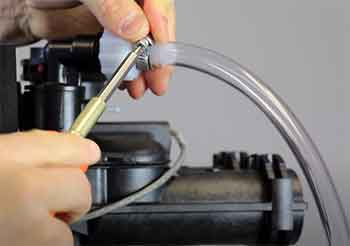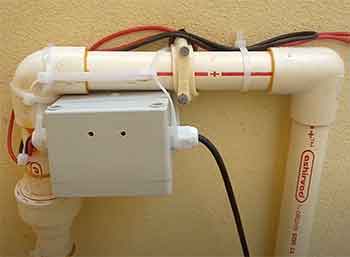The water softener has become an important part of every household. It is also used in the agriculture and commercial sectors.
It removes the unwanted grains from the water so that we can get clean and fresh water.
But there’s a debate on a 3/4 vs. 1-inch water softener. Some people often get confused about which water softener will be best for them.
If you are also confused about your options, this article is for you.
3/4 Or 1 Inch Water Softener? – A Brief Overview

A water softener is a kind of filtration system for the house or industry that removes all the hardness–causing materials such as calcium, magnesium, iron, etc., from the water and keeps the water clean and soft.
Without a water softener, you will face several problems.
The hard material of the water can cause clogs to your faucet.
Not only clogs, but these can also leave some serious stains on your bathroom’s floor or sink, which are very tough to remove.
These hard materials also cause harm to your hair and skin. However, the water softener can save you from the side effects of these hard materials.
But choosing the water softeners for your house with the right size is a tough job. You have to keep a few things in mind before selecting the size of the adapter of your water softener.
The water softener connectors are also called hoses. The hoses come in different sizes such as 1″, ½”, ¾”, 5/8″ etc. But all of these sizes are not suitable for households.
1″ and ¾” water softeners are mainly used in the residential water supply. But which one you should choose depends on a few different things.
Go through this article, and you will be able to know to tell the differences too.
A Quick Comparison Table
Here’s a quick comparison on ¾ vs 1-inch water softener for your better understanding –
| Specifications | ¾ inch Water Softener | 1 inch Water Softener |
| Price | Comparatively cheap | Components (meters, valves) of 1-inch water softener are almost 30% to 40% more expensive than that of ¾ inch. |
| Installation Process | Easy, can be done without a plumber | Need professional help |
| Flow rate | Lower than 1 inch | Competitively high |
| City Inspectors’ Permission | Yes | Sometimes you have to pay more for using 1-inch water softener |
| Diameter | Smaller than 1 inch | Almost 78% larger |
| Material | PEX, CPVC, Copper, Braided Stainless Steel, PVC | PEX, CPVC, Copper, Braided Stainless Steel, PVC |
| Online Purchase | Available | Available |
Differences Between 3/4 And 1 Inch Water Softeners
- Price
If you want to save money, ¾ inch water softener would be a great choice. A water softener comes with different components like adapters, valves, meters, etc.
Water softeners with ¾ adapters or hoses are less costly than 1-inch ones because the components that come with ¾ inch water softener are also cheaper.
On the other hand, components that come with a 1-inch water softener are almost 30% to 40% more expensive than the components of ¾ inch water softener.
So in case of budget issues, feel free to choose the ¾ inch water softener. But it has some disadvantages also. We will discuss that in the further part of this article.
- Installation Process
Another perk of having a ¾ inch water softener is that it’s easy to install. No one wants the hassle, and some people do not like to pay plumbers.
They want to do their household plumbing by themselves. If you are one of them, you should definitely choose ¾ inch water softener.
There is no additional work required to install a ¾ inch water softener. The installation process is very easy, and you can do it all by yourself.
You just need to disconnect the existing hose or connector from the system and replace it with the new one.
But installing a 1-inch water softener is a little bit difficult. Let me explain why.
If the opening of the main water supply is ½ inch or ¾ inch, then you can’t connect a 1-inch water softener with the main water supply system.
The water pressure will be too low, and you will face difficulties in water flow when 3 or 4 faucets will be used together.
That’s why in the case of installing a 1-inch water softener, you have to replace the water pipes to 1″ and then set up the 1-inch connector or hose to the new system.
- Flow Rate

When we discussed the two water softeners’ price and installation process, you noticed more advantages in ¾ inch water softener.
Based on these two points, you might think that the ¾ inch water softener is the best option for you. But the ¾ inch water softener has some problems as well.
The flow rate of ¾ inch is lower than that of the 1-inch water softener. It could be a major problem if you have a big house with many members. Let us explain why.
When one faucet is open, you won’t see much difference in the water flow. But when 4/5 faucets are open at a time, the ¾ inch water softener won’t be able to supply this much water at a time because of its low flow rate.
However, some of the city inspectors do not allow 1-inch water softener for household use because of this high water flow rate. You have to pay more to install a 1-inch water softener for your house.
The confusion about these water meters will be clear if you think about these pros and cons.
- Diameter and Material
It’s kind of obvious that a 1-inch water softener has a larger diameter than that of a ¾ inch one. 1-inch water softener hose is almost 78% larger than ¾ inch one.
So, you will get much water at a time if you install a 1-inch water softener.
Both of the two water softeners are available in PEX, CPVC, Copper, Braided Stainless Steel, PVC material.
Frequently Asked Questions (FAQ)
It totally depends on your water consumption rate. If your house needs more water than average, you can oversize your water softener. But remember, you have to pay more for the oversize one.
Again, it depends on the total number of members of your house. Usually, an adult uses 80 gallons of water per day. Multiply 80 with the total number of adult members of your house. That’s how you can figure out how big your water softener should be.
Any kind of pipe such as PVC, CPVC, stainless steel pipe can go into a water softener. But you will need a connector to connect the pipe with the water softener. Generally, 1 inch or ¾ inch connectors are used for this.
A water softener usually lasts 3 to 10 years, depending on the quality of the device.
Final Words
The other name for water is life. Having pure water in the house is the most crucial for everyone. A water softener helps us to have clean water which is free from hard material.
Choosing the correct connector for your water softener is very important because the entire water system of your house depends on that.
The confusion about 3/4 vs. 1-inch water softener is common, and you can make the right decision by considering the pros and cons mentioned above.
